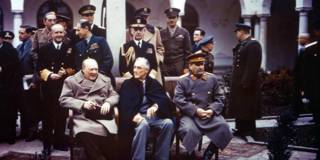
The Enduring Lessons of Stalin’s Wartime Endgame
If Western efforts to contain Soviet expansionism taught us anything, it is that the only way to deter totalitarian thugs is to confront them. Had the West responded more forcefully to Russia’s 2008 invasion of Georgia or its 2014 annexation of Crimea, Vladimir Putin might not have launched a full-scale war against Ukraine in 2022.
TOULOUSE – Earlier this summer, an Australian friend called to congratulate me on my “OBE.” Puzzled, I asked, “What on earth do you mean?” He replied, “I noticed in the newspaper’s birthday column that you are now Over Bloody Eighty.”